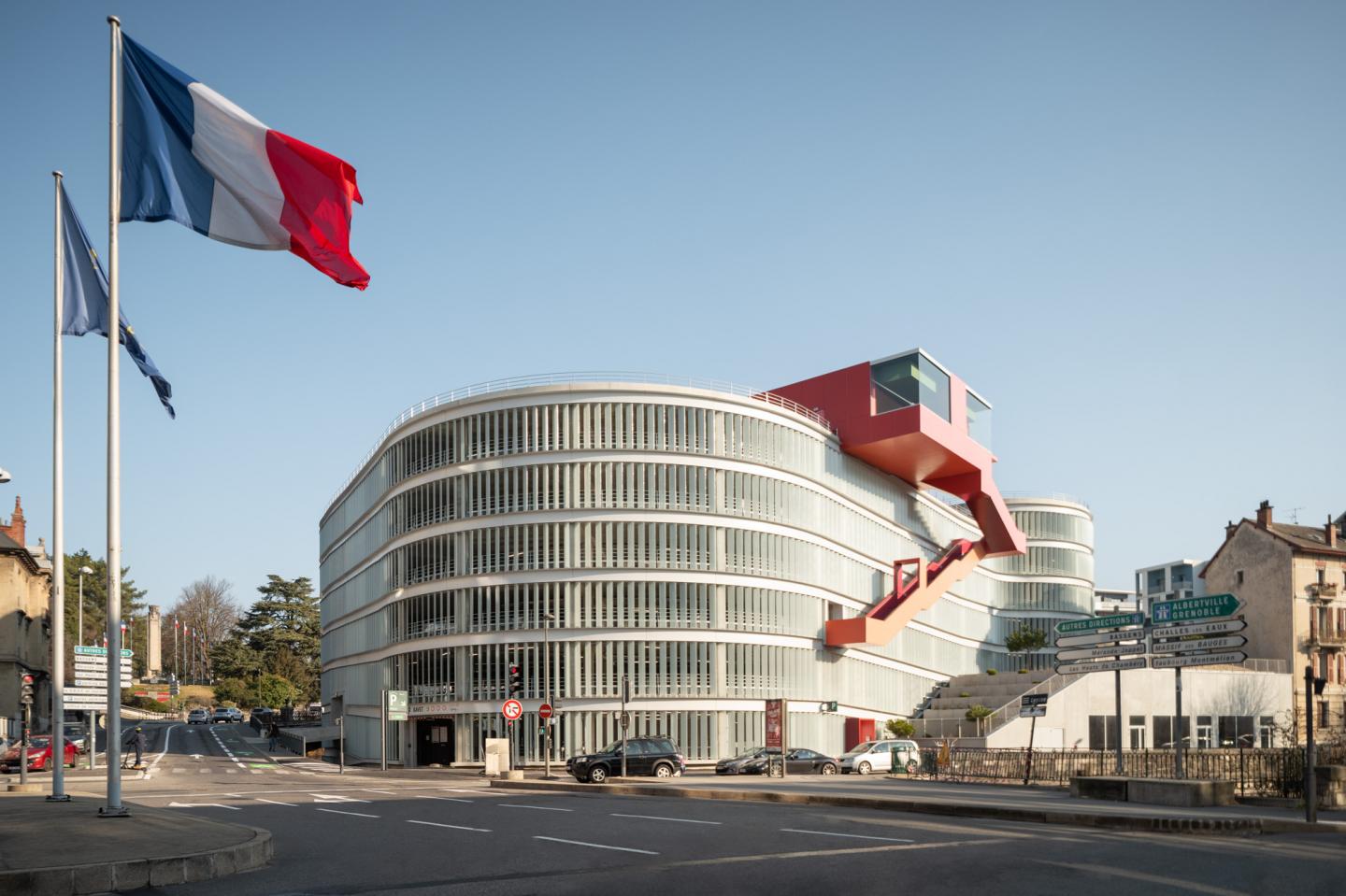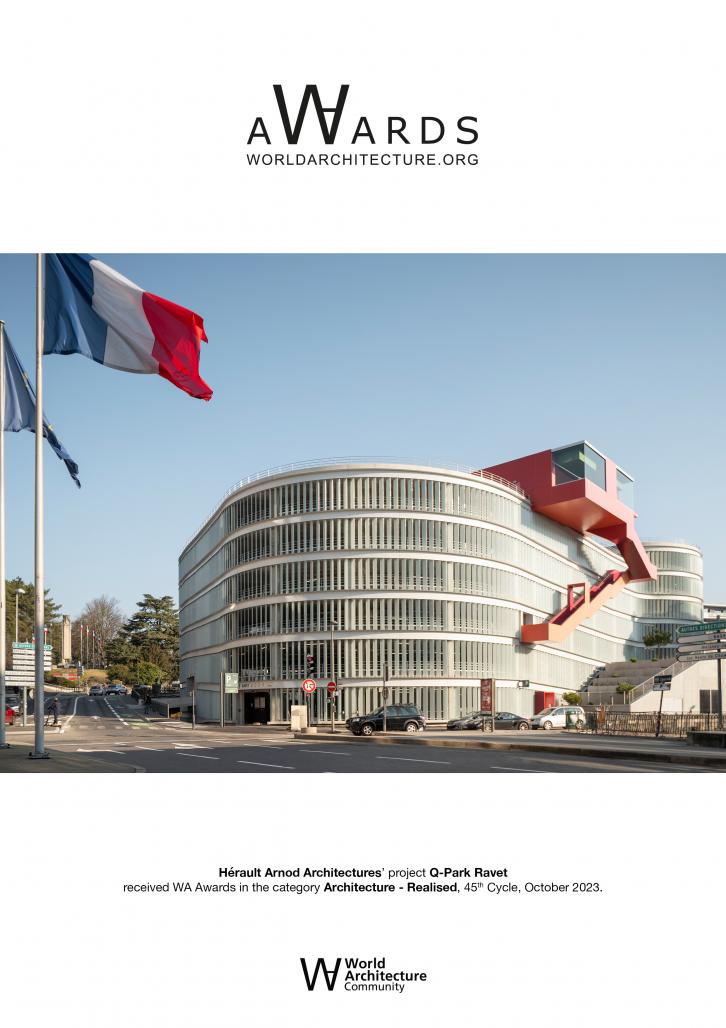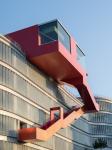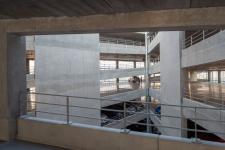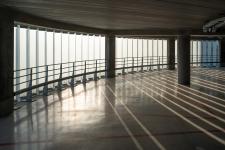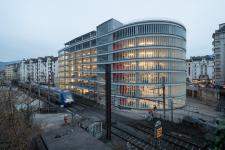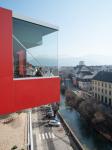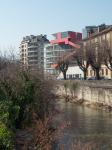Designed for QPark by Hérault Arnod Architectures, in collaboration with artist Krijn de Koning, Ravet is a new 499-space car park with a curved and translucent volume. The structure is located on the edge of the historic district and provides users with a panoramic view of the city of Chambéry and the mountains beyond.
SCULPTURAL ARCHITECTURE
The land chosen by the City for construction of the car park construction is located along rue de Boigne, a historic road in the Chambéry city center. The street, built in the first half of the 19th century and lined with arcades, leads to the castle of the Dukes of Savoy, a major heritage building built in the 12th century, passing by the famous Elephant Fountain. Opposite the castle, the perspective of the street converges on the Q-Park Ravet project, with a backdrop of mountains.
The question pondered by the architects was how to build a car park, considered utilitarian, facing the city's most historic monument. That question was met with a unique architectural response in the form of a proposition to, in addition to the program, create a sculptural belvedere located in the axis of the street and the castle, imagined in collaboration with artist Krijn de Koning.
THE CAR PARK, CURVED AND TRANSLUCENT
The car park is organized in a triangle, with rounded corners that minimize the mass effect and create sleek and vanishing lines that make the building appear smaller than it actually is. The interior space is designed like a car ride organized around a double circuit: you go up via slightly sloping lots that wrap around a central triangular patio; you descend directly via a cylindrical ramp around a central void.
The building is a translucent and light volume that blends smoothly into the urban fabric, with curves at the ends of the triangle corresponding with those of the rounded corners of the neighboring buildings. The facades are 50% empty, so the car park is considered exempt from fire regulations, and they are clad in vertical glass strips placed at 45° (60% recycled glass and enameled to be opalescent). The empty gaps create a variety of additional views of the city.
The exterior of the building consists of a U-shaped metal profile that wraps around the building from street level to the top floor. Between these metallic U-shaped sections, the glass strips mask the interior in a show-and-tell pattern that can be seen from both inside and outside the garage. By day, the functionality of the building is on full display. By night, perceptions changes thanks to indoor lighting that softly etches the urban landscape.
Located on the car park rooftop, shading structures equipped with photovoltaic cells shelter the cars.
The interior of the triangular patio is a garden of shadows, planted with undergrowth vegetation – ferns, periwinkles, maples, hydrangeas, and more. The facing south terrace features Mediterranean-type vegetation with umbrella pines, fig trees, lavender, and grasses.
THE BELVEDERE, ORTHOGONAL AND COLORFUL
The strategic position of the project at the end of the main historical city street led to the design of an architectural solution that offers something more to both residents and visitors, adding another function to the parking project. The belvedere lends a public and urban dimension to the building, enabling a new way to embrace the city.
Via an external staircase, the belvedere can be accessed from the second floor without going through the parking garage. The belvedere-sculpture, cantilevered out to the axis of the rue de Boigne, is attached to the building of the car park, with tones subduing the warm colors of the old town houses facades. From above, it offers a majestic panorama towards the urban landscape, the river, the castle, and the Alps. Descending the belvedere staircase puts you on the axis of the street, and it is framed at mid-height to highlight a unique perspective of the historic city.
In the other direction, the street perspective ends with the mountain background and the curved, translucent volumes combination of the car park and the sculptural belvedere that leans against it in the axis of the city street.
The architectural gesture is based on the complementarity between the curved, minimal, and translucent car park facades, and the sculptural sky bar, orthogonal and colored. This assembly of the car park and the belvedere gives the building its unique identity. It was in line with this idea that the collaboration with Krijn de Koning was established.
2017
2021
Floor area: 14,500 m²
Cost of the works: €10 M excl. VAT
Program: Silo car park with 499 spaces
Belvedere / Skybar
Hérault Arnod Architectures, Lead Architect
Krijn de Koning, Artist
Art Entreprise, Georges Verney-Carron, Artistic Development
Arcadis, Structural Design, Fluid Engineering and Roadworks & Utilities
Q-Park Ravet by Isabel Hérault in France won the WA Award Cycle 45. Please find below the WA Award poster for this project.
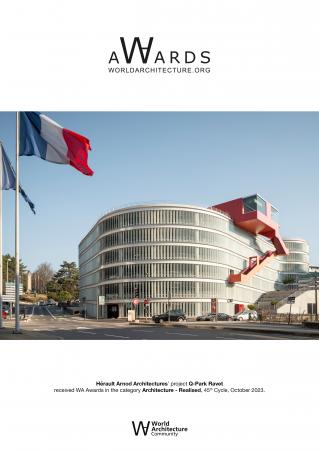
Downloaded 0 times.
